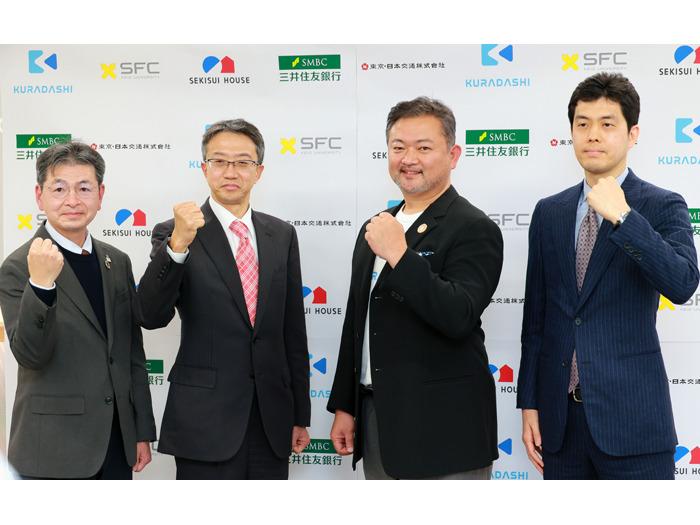"Portable Wi-Fi" Review
25/03/2022

Image of Kuradashi, Keio University SFC Research Institute and demonstration experiment for "Kodomo Shokudo" support DX
On February 14, Kuradashi, which operates the social contribution shopping site "KURADASHI", collaborated with Keio University SFC Research Institute on data on food stocks held by companies in the event of a disaster and in Osaka Prefecture. Announced that it will carry out a demonstration experiment to match with the "children's cafeteria". The implementation period is scheduled from February 14th to March 10th. The target groups are the Sumiyoshi Neighboring Business Promotion Association, the Yodogawa Ward Children's Whereabouts Liaison Committee, the Children's Heya "Shima ☆ Room", the Nagahori Children's Cafeteria, and the ChunChunTORICA Utsubo Children's Cafeteria. The experiment is aimed at social implementation of the smart food chain platform (SFP) in the Cabinet Office's Strategic Innovation Creation Program (SIP) "Smart Bio-Industry / Agricultural Fundamental Technology" in which Keio University SFC Research Institute participates. , Realized because the company's proposal "Creating and demonstrating a mechanism for providing stable foodstuffs to children's cafeterias" was adopted in the solicitation for "examination of new solutions" aimed at the entry of new organizations from outside the consortium members. bottom. The smart bio-industry / agricultural basic technology was established by the Council for Science, Technology and Innovation of the Cabinet Office to realize science and technology innovation through management that transcends the boundaries of ministries and agencies and traditional fields. National project. In addition, the smart food chain platform is a viewpoint from the consumer side, in addition to the viewpoint from the supply side such as production, processing, and distribution, centering on agricultural products, and the "arteries" and "veins" in the food supply chain such as resource circulation and research and development. A linked model that circulates. The production, processing, distribution, sales, export, and consumption of agricultural, forestry and fishery products will be integrated and data will be linked. Sekisui House and Sumitomo Mitsui Banking Corporation are participating as food providers for community children's cafeterias that provide free or inexpensive meals to children in need, their parents, and local people. As a company in charge of delivery to the children's cafeteria, Tokyo and Nihon Kotsu will cooperate. According to a survey by the National Children's Cafeteria Support Center, Musubie, there are more than 6,000 children's cafeterias nationwide as of December 2021, providing a place for children to stay and a place for multi-generational exchange, not limited to providing meals in Korona-ka. It is said that it is responsible for. In addition, as for community development activities carried out by the children's cafeteria, "efforts to promote multi-generational exchange" were followed by "efforts to reduce food loss" at 44.7%. On the other hand, it is known from past questionnaire surveys that the issue is "insufficient foodstuffs" and that they are seeking support for foodstuffs and funds. The company operates a social contribution shopping site "KURADASHI" for the purpose of reducing food loss. Part of the sales is used as the "Kuradashi Fund" to support food banks, which are about 140 organizations nationwide. According to the company, they were thinking of supporting children's cafeterias, which have many problems even in Korona-ka, but it is difficult to create a mechanism to stably provide ingredients to more than 6,000 children's cafeterias nationwide, so support is provided. Wasn't done enough. In addition, there were many inquiries from companies that wanted to provide surplus food to the children's cafeteria. Against this background, we have solved the problems related to matching by utilizing data linkage with SFP. By collaborating with a company that wants to provide surplus food, it is said that a demonstration experiment will be conducted with the aim of providing smooth, prompt and stable food to the children's cafeteria. In this experiment, Sekisui House, which jointly conducted a social contribution internship "Kuradashi Challenge" for the purpose of solving the food loss problem in the region and promoting special products, and the share of disaster stocks with the aim of reducing food loss and realizing SDGs. Sumitomo Mitsui Banking Corporation, which operates a ring and an employee-only site, participated. By registering food information of disaster stocks held by Sekisui House and Sumitomo Mitsui Banking Corporation in SFP and linking the data, we will carry out food matching with five children's cafeterias in Osaka Prefecture. .. Matched foods will be delivered from Sekisui House or Sumitomo Mitsui Banking Corporation's storage locations around Osaka Prefecture using taxis and trucks from Tokyo / Nihon Kotsu. SFP is scheduled to officially start service after April 2023. After the service starts, it will cooperate with information on surplus foods provided by food manufacturers and distributors, and will promote efforts to enable smooth and prompt provision.
Last updated: CNET Japan